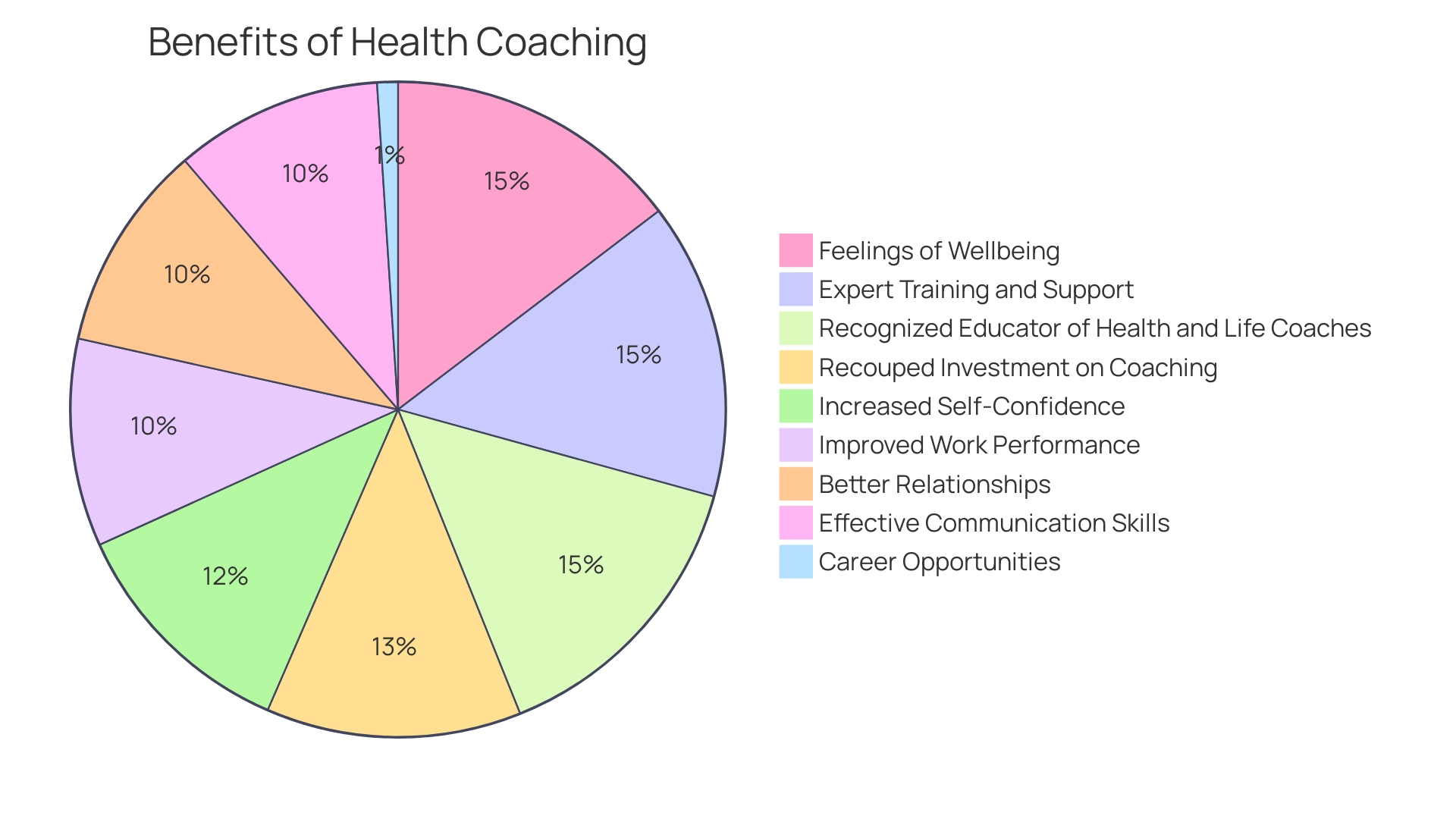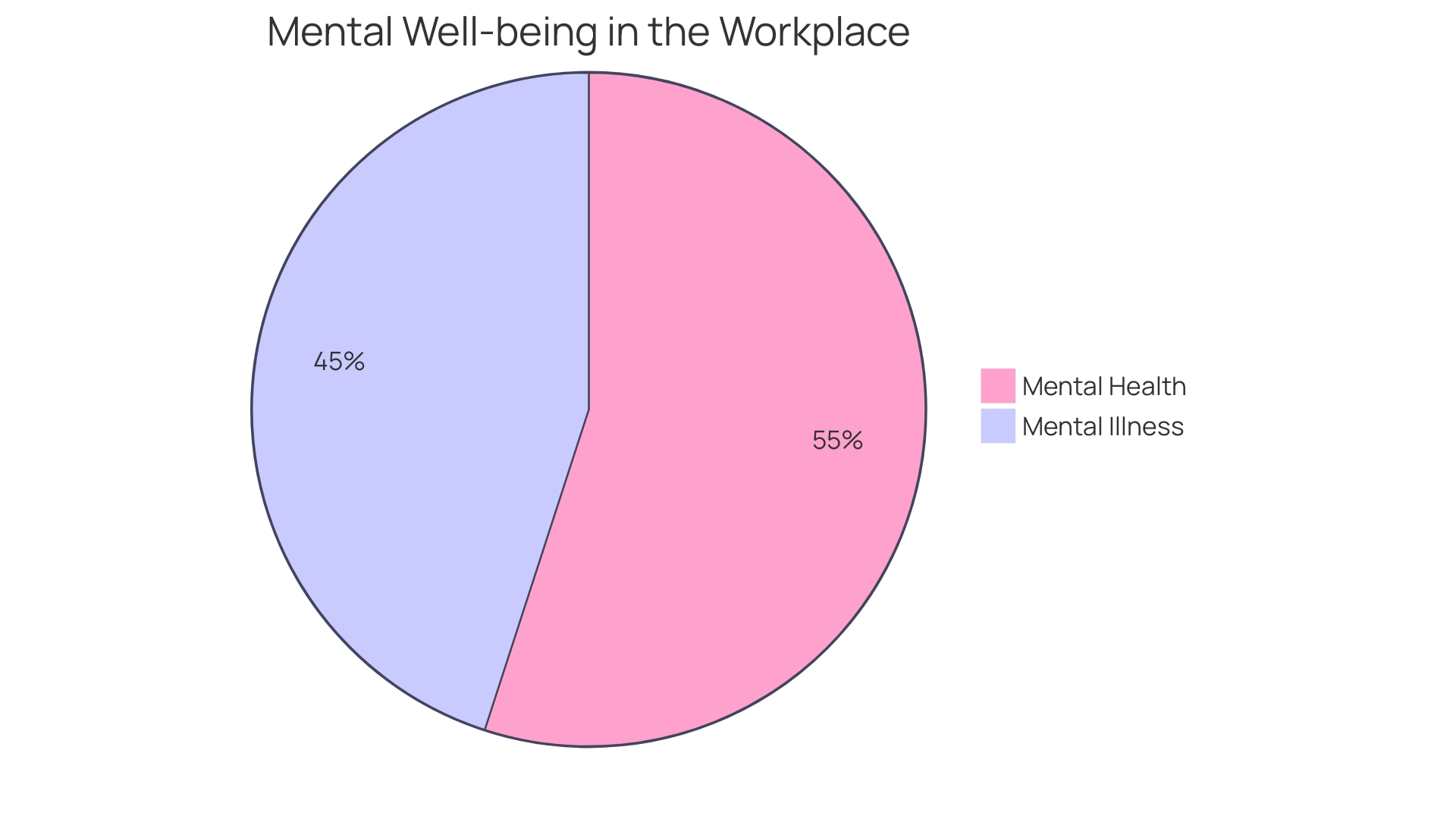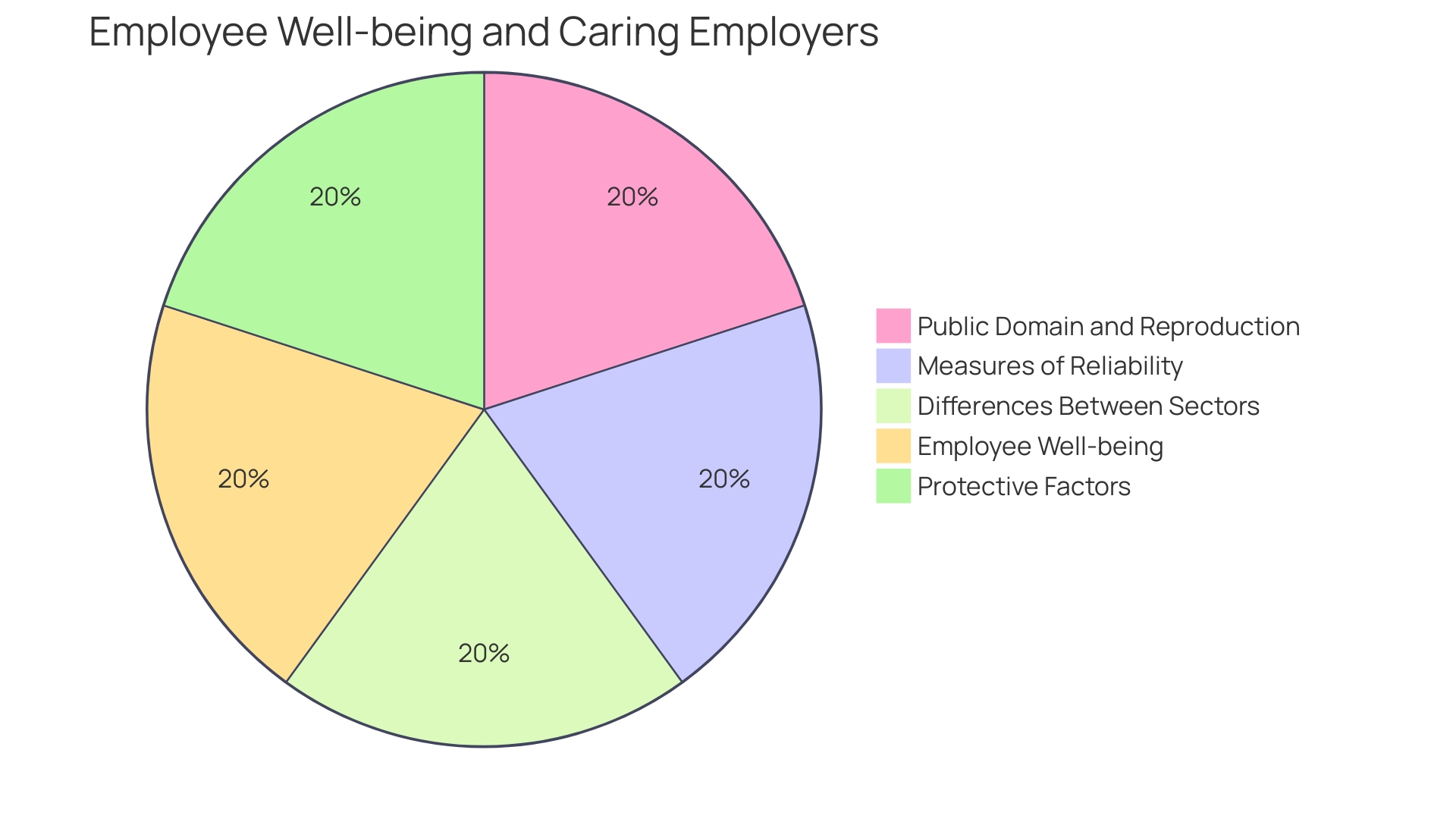Introduction
Corporate wellness coaching has emerged as a crucial element in fostering the well-being of employees and promoting organizational health. These coaches serve as catalysts for personal and professional growth, offering tailored support to individuals and teams. Their role extends beyond advocating for better nutrition and exercise, encompassing stress management, social connections, and holistic health.
With the U.S. health system facing challenges in cost management and patient outcomes, the need for proactive wellness support is evident. The integration of coaching into employee benefit programs is a strategic move that enhances mental health, workplace productivity, and overall engagement. The growing recognition of the value coaches bring to private practices, corporate wellness programs, and healthcare insurers has resulted in a flourishing industry.
By prioritizing the well-being of their employees, organizations invest in their most valuable asset and cultivate a healthier, more productive workforce.
What is a Corporate Health and Wellness Coach?
Corporate health and wellness coaches are becoming increasingly integral in nurturing the well-being of employees, serving as catalysts for personal and organizational health. These professionals offer tailored support, guiding individuals and teams to adopt positive lifestyle choices and forge a sustainable work-life harmony. Their role is not only about encouraging better nutrition or more exercise, but also encompasses managing stress, fostering social connections, and promoting overall holistic health.
The significance of such coaching is underscored by the fact that the U.S. health system, despite its advancements, faces the daunting challenge of managing high costs, improving patient outcomes, and reducing clinician burnout. The traditional reactive approach to health events has been called into question, urging a shift towards proactive wellness support.
Take the case of Gabriel, who, instead of relying solely on medication, chose to transform his lifestyle under the guidance of a wellness program. The comprehensive curriculum and focus on the interconnectedness of various health aspects, including stress resilience and nutrition, empowered him to achieve a more balanced and healthy life.
Additionally, the entry into the health coaching profession is becoming more structured, with organizations like the National Board for Health and Wellness Coaching (NBWHC) setting approval and training standards. Prospective health coaches now have clear pathways to certification, opening doors for more people to contribute to the health sector's evolution.
Employer health costs are surging, prompting companies to seek ways to maintain employee well-being without escalating expenses. As such, health coaches are becoming pivotal in addressing these concerns by offering strategies that enhance mental health and workplace productivity while keeping costs in check.
Furthermore, research emphasizes the employer's role in influencing their employees' health, advocating for a holistic health approach that extends beyond the traditional healthcare system. Programs and policies that protect and promote employee health are not just ethical but also make good business sense, as they directly impact engagement, retention, and productivity.
The health coaching industry itself is flourishing, with a market size of $7.6 billion and a growing recognition of the value coaches bring to private practices, corporate wellness programs, and healthcare insurers alike. By leveraging health coaching, organizations can significantly reduce claims costs and improve overall employee health.
In conclusion, organizations that prioritize the well-being of their employees through the support of health and wellness coaches are investing in their most valuable asset. The integration of coaching into employee benefit programs is an essential strategy for cultivating a healthier, more engaged, and productive workforce.

Key Responsibilities of a Corporate Wellness Coach
Corporate wellness coaching plays a pivotal role in shaping the health and productivity of an organization's workforce. The duties of these coaches extend far beyond basic health assessments. They are instrumental in devising wellness initiatives tailored to the unique needs of a company's employees. They conduct one-on-one coaching, lead group workshops, and address risk factors while encouraging healthier lifestyle choices.
A compelling case for wellness coaching's impact can be found in the story of Gabriel Lee. After suffering a heart attack, Gabriel took charge of his health by joining the HMS Corporate Learning program, which emphasizes sustainable health practices across nutrition, exercise, stress resilience, and more. His journey from a heart attack to embracing a holistic lifestyle underscores the transformative power of wellness education and coaching.
Moreover, in a time when $51 billion is being invested annually in employee wellness, the demand for programs that truly make a difference is paramount. A report by Wellable predicts this investment will double by 2030, reflecting the growing emphasis on employee well-being in the corporate sector. Yet, a study from the Industrial Relations Journal cautions against complacency, revealing that many wellness interventions fail to show a positive impact on employee well-being, with volunteer work being a notable exception.
In light of this, it's clear that corporate wellness programs must be thoughtfully designed to be effective. They should encompass behavior change strategies, as demonstrated by Johnson & Johnson's comprehensive employee program, which fosters healthy habits to enhance overall well-being.
As the industry evolves, the insights of professionals like AK Ikwuakor, a seasoned executive coach, are invaluable. His perspective reveals that even leaders, often viewed as invincible, can benefit from the humanizing and supportive nature of wellness coaching. It is this understanding of the deeply human aspects of corporate life that positions wellness coaching as a crucial element in an organization's success.
By embracing a holistic approach to health, as advocated by the McKinsey Health Institute, organizations can help employees lead fuller lives, contributing not only to the individual's well-being but also to the collective health of the workforce.
Designing and Developing Corporate Wellness Programs
At the heart of crafting a thriving work environment lies the role of the innovative corporate wellness coach. These skilled professionals are dedicated to sculpting personalized wellness initiatives that resonate with the unique culture and aspirations of each company and its employees. Their approach begins with a meticulous assessment of the company's needs, pinpointing opportunities for enhancing employee well-being. By strategizing methods to bolster health and happiness at work, these coaches work hand in hand with HR and leadership teams to ensure that wellness strategies not only foster a positive atmosphere but also echo the organization's objectives and ethos.
The paradigm of viewing employees as pivotal investments rather than mere expenditures is gaining traction, with evidence suggesting that prioritizing employee well-being can lead to heightened productivity and loyalty. In fact, research from the London School of Economics and Political Science corroborates that organizations focusing on their employees' well-being see improved productivity and retention, ultimately reflecting positively on the bottom line. To this end, wellness coaching programs have evolved, now encompassing an array of services beyond physical health, including digital fitness, mental health support, mindfulness, and nutritional advice, broadening the scope of corporate wellness into a multifaceted discipline.
This expansion is reflected in the staggering growth of the wellness industry, which, according to the Global Wellness Institute, has become a multi-trillion-dollar market, outpacing global GDP growth. With a forecasted rise in corporate wellness spending to $100 billion over the coming decade, the value placed on workplace wellness is undeniably on an upward trajectory. Such investments in the well-being of employees are not just about creating a more enjoyable workplace; they are strategic moves toward cultivating a more engaged, productive, and resilient workforce, where every company is increasingly recognized as a wellness company at its core.

Providing One-on-One Coaching Sessions
As the contemporary workplace evolves, corporate wellness coaches are becoming integral in fostering employee well-being. These professionals offer tailored one-on-one sessions that delve into personal health objectives, crafting actionable plans while fostering motivation and accountability. By identifying and dismantling barriers to wellness, coaches empower employees to cultivate healthy habits and achieve lasting lifestyle improvements.
A case in point is Gabriel's story, who, after a heart attack, sought the structured guidance of Dr. Elizabeth Frates's HMS executive program. The comprehensive approach, emphasizing sustainability and covering all facets of health, enabled Gabriel to grasp the interconnected nature of his lifestyle choices and their impact on his overall well-being.
Similarly, strategic investments in companies like CoachCare highlight the burgeoning demand for technology-enhanced wellness solutions. CoachCare’s platform seamlessly integrates remote patient monitoring, virtual care, and coaching services, underscoring the potential of such innovations to enhance patient care and outcomes.
Artificial intelligence, too, is finding its place in the wellness coaching domain. By sifting through vast data sets, AI can complement coaching programs by identifying individuals at risk and tailoring interventions accordingly. This synergy between human expertise and technological prowess exemplifies the evolving landscape of executive coaching as defined by the International Coaching Federation: a creative partnership that maximizes an individual's potential.
In fact, embracing such multifaceted support frameworks is more than a trend—it's a response to the pressing need for improved patient outcomes and proactive health management, as highlighted by experts who advocate for a shift from reactive to preventative care.
Ultimately, the role of corporate wellness coaches transcends mere advice-giving. It is about instilling a culture of health that aligns personal goals with actionable support, thereby bridging the gap between what healthcare systems aim for and what they achieve. This holistic perspective is crucial in today's high-stress work environments, providing a beacon for organizations genuinely invested in their employees' health and happiness.
Conducting Group Sessions and Workshops
Corporate wellness coaches aren't just one-on-one motivators; they're the architects of group synergy in the workplace. Picture a scene where employees are gathered, not for a mundane meeting, but for an invigorating session that dives into the essentials of health and wellness. These interactive workshops peel back the layers of topics like nutrition and exercise, stress management, and the ever-elusive work-life balance. It's in these group dynamics, guided by a coach's expertise, where employees uncover practical strategies to enhance their well-being, and equally important, they find a communal spirit to cheer on one another's health journeys.
Consider Gabriel Lee's story - an awakening prompted by a heart attack while supporting his wife through chemotherapy. His commitment to a healthier lifestyle led him to Harvard Medical School's Corporate Learning program. Here, Gabriel learned that well-being isn't just about diet; it's about the harmony of lifestyle pillars, including exercise, sleep, stress resilience, positive social connections, and avoiding harmful substances. Gabriel's experience illustrates the profound impact of comprehensive health education, similar to what corporate wellness coaches bring to the workplace.
This educational approach is backed by a surge in companies integrating mental health resources into their benefits, recognizing the evolving needs of their workforce. Therapists like Brad Smallwood, who served employees discreetly at tech company Square, represent this shift towards accessible mental well-being support. As businesses continue to embrace this holistic view, where every firm is seen as a wellness company, the role of corporate wellness coaching becomes increasingly vital in fostering an environment where employees thrive.
Moreover, the intersection of artificial intelligence (AI) with executive coaching offers a poignant example of how technology can complement rather than replace the human touch in wellness initiatives. As AI provides data-driven insights, wellness coaches translate this information into personalized strategies, ensuring that each employee's path to well-being is as unique as their fingerprint. This collaboration between human and machine is shaping the future of workplace wellness, where the focus is squarely on the individual's mental and emotional health as the cornerstone of a productive, engaged workforce.
Addressing Risk Factors and Promoting Healthy Behaviors
Health and wellness coaches in the corporate sector are champions of transformative change, empowering employees to embrace healthier lifestyles and mitigate workplace health risks. Their role extends beyond the traditional scope of wellness programs, as they delve into the very fabric of an organization's culture, shaping policies and environments conducive to well-being. These coaches are instrumental in fostering education around key health pillars—nutrition, physical activity, sleep quality, stress resilience, social connections, and avoidance of harmful substances—integrating a holistic view of health that resonates with today's broader definition of well-being.
Case studies, such as that of Gabriel Lee, who experienced a heart attack while already grappling with high cholesterol, underscore the life-altering impact of wellness coaching. Gabriel's journey through the HMS Corporate Learning program highlighted the interconnectedness of lifestyle factors and the importance of sustainable health practices. Moreover, research indicates that lifestyle coaching can significantly improve cognitive function, as seen in Alzheimer’s patients who benefited from personalized coaching that emphasized diet, exercise, and brain training.
The American Heart Association's findings that heart disease remains the leading cause of death in the U.S., with work-related stressors like job strain and effort-reward imbalance contributing to the risk, further emphasize the need for comprehensive wellness strategies in the workplace. Health coaches, although not medical professionals, are becoming increasingly vital in this arena. They are part of a solution reshaping healthcare, focusing on prevention and health maintenance outside of traditional clinical encounters.
As the medical field evolves, so does the role of corporate health coaches. They embody the shift towards value-based care, where the success of health plans is measured not just by predictive analytics but by the ability to effectively lower risks through proactive support. With the right coaching and support, as noted by a two-time Olympic medalist and corporate high-performance consultant, alongside a physician behavioral scientist, organizations can bridge the gap between set health goals and actual outcomes, leading to healthier, more engaged, and productive employees.
Improving Employee Health and Productivity
Corporate wellness coaches play a vital role in enhancing the health and well-being of employees, fostering a collaborative partnership that inspires individuals to reach their personal and professional potential. Their impact extends beyond the personal growth of employees, contributing also to the organization's success. By guiding employees through personalized goal setting and behavior modification strategies, wellness coaches not only promote healthier lifestyles but also directly correlate to improvements in workplace productivity and engagement.
Employee engagement, characterized by motivation, commitment, and a sense of belonging, is central to individual and organizational achievement. A well-implemented wellness program is a powerful tool that can galvanize this engagement. Companies that prioritize employee well-being are investing not just in the health of their workforce, but in the very essence of their business success. In today's rapidly evolving corporate landscape, with health coaching burgeoning into a multi-billion dollar industry, the role of wellness coaches has become more pivotal than ever.
These dedicated professionals support employees in managing stress, adopting healthier diets, and increasing physical activity, which are essential components of a robust wellness strategy. The research underscores the wide-ranging benefits of such initiatives, revealing that holistic health approaches—encompassing mental, physical, social, and spiritual well-being—can significantly elevate the quality of life.
As organizations navigate the post-pandemic era, the demand for digital health solutions and telehealth services has surged, signaling a shift in how wellness support is delivered. With substantial economic value at stake, estimated at trillions globally, the integration of wellness coaching into employee benefits programs is not only a strategic human resources endeavor but also a sound economic decision. Such investments not only aim to reduce healthcare costs but also to attract and retain top talent, as better health is strongly correlated with higher productivity and workforce participation.
Enhancing Mental Health and Wellbeing
To cultivate a robust culture of well-being, corporate wellness coaches are indispensable in enhancing not just the physical, but also the mental health of employees. They are equipped with an array of strategies and tools to help staff manage stress, build resilience, and achieve a harmonious work-life balance. Given the interconnectedness of mental, emotional, and social wellness, these coaches focus on creating a supportive environment that encourages satisfaction and value among team members. This holistic approach to employee well-being is significant for businesses, with research showing a 4 to 6 dollar return on every dollar invested due to heightened productivity and reduced costs. These outcomes underscore the pivotal role of mental health in fostering a thriving, innovative, and engaged workforce.
Increasing Employee Engagement and Retention
In today's fast-paced work environment, health is no longer just about the absence of illness; it's about fostering an integrated view of employees' mental, physical, spiritual, and social functioning. Corporate wellness coaches play a crucial role in this modern approach to health by cultivating a holistic culture of well-being within organizations. Their presence is a testament to a company's commitment to 'adding years to life and life to years' for their staff.
A comprehensive approach to employee well-being goes beyond traditional health measures, addressing a wide array of factors that contribute to a person's overall state, such as quality sleep, time in nature, and mental peace—areas where employer support can make a significant difference. Recognizing the importance of these factors, companies are investing more in wellness programs—spending is projected to reach $100 billion by 2030. This investment reflects an understanding that when employees feel cared for on a deeper level, engagement and satisfaction soar.
Moreover, the concept of 'emotional salary' is gaining traction, emphasizing non-monetary aspects like purpose, development, and work-life balance, which are vital once employees' basic monetary needs are met. Such factors are often more compelling than wages alone, fostering a sense of value and belonging among the workforce.
It's evident that mental well-being is not just a personal issue but has significant implications for business. With over 15% of the global working population grappling with mental health challenges that affect their productivity, the need for a supportive work environment is more critical than ever. A corporate wellness coach does not merely introduce temporary fixes but strives to create a sustainable, caring culture that resonates with employees and aligns with the organization's values. Initiatives like Outdoor Experience Days by L.L.Bean exemplify the kind of creative strategies that can resonate with employees' values and enhance their connection with their workplace.
As we look to the future, the role of wellness coaches is becoming increasingly integral to the fabric of a successful company, fostering a work environment where each individual feels genuinely supported in their holistic health journey.

Tools and Resources for Corporate Wellness Coaches
Armed with the latest innovations and a deep understanding of individual health goals, corporate wellness coaches are reinventing the support they provide within the workplace. By combining the wisdom of seasoned professionals, including Olympic athletes and behavioral scientists, these coaches are redefining the delivery of health care. They're not only reacting to health events but proactively promoting health, leveraging tools such as health assessments, wellness platforms, and educational resources to foster an environment where employees can thrive.
The essence of coaching, as outlined by the International Coaching Federation, is a personalized process that ignites one's potential both personally and professionally. This intimate relationship between the coach and employees focuses on enhancing outcomes for both the individual and the organization. In this capacity, corporate wellness coaches are pivotal in ensuring that employees feel heard and understood, a practice that is foundational to fostering a caring work environment.
Real-world examples underscore the shift towards a more proactive approach to employee well-being. Leading tech firms have acknowledged the growing need for mental health support by providing discreet, on-site therapy options and integrating digital tools such as wellness apps into their benefits offerings. Such initiatives are a testament to the evolving landscape of corporate wellness, where mental resilience is just as important as physical health.
The significance of this evolution is reflected in the burgeoning health coaching industry, now valued at $7.6 billion. Health coaches are increasingly found in private practice, insurance companies, and especially within corporate wellness programs. They play a crucial role in improving employee health and reducing healthcare costs. The intimate coach-client relationship is central to advancing both individual wellness and organizational health, ultimately contributing to a more engaged and productive workforce.
Recent survey research of over 4,000 employees globally and insights from HR leaders emphasize the mounting pressures of an 'always-on' work culture. In response, companies are seeking to balance the demands of work with the well-being of their employees. Corporate wellness coaches, equipped with a suite of tools and a forward-thinking mindset, are at the forefront of this transformation, helping employees navigate the complexities of modern work life and achieve a healthier, more balanced existence.
Measuring Success and Data Analysis
Evaluating corporate wellness programs goes far beyond simply tracking participation. It's about understanding the true impact on an employee's holistic health, encompassing their mental, physical, social, and spiritual well-being. With organizations investing heavily in employee wellness—$51 billion in 2020 with projections of reaching $100 billion—HR professionals are tasked with not just implementing these programs but also measuring their effectiveness. Through a comprehensive approach, wellness coaches analyze health outcomes, gauge employee engagement, and use data insights to continuously refine their strategies. This ensures that programs not only exist as a testament to an employer's commitment to their workforce but also drive meaningful improvements in their lives. McKinsey Health Institute's research supports a move toward holistic health, a concept that goes beyond the absence of illness and focuses on an integrated view of health. Factors such as quality sleep and time spent in nature, which largely fall outside the traditional healthcare system, are areas where employers can play a significant role. Despite the vast array of digital wellness solutions, a notable study from the Industrial Relations Journal highlighted that the only intervention with a positive effect on well-being was providing employees the opportunity for charity or volunteer work. Meanwhile, the enterprise analytics team at a leading organization is setting an example by embedding analytics into strategic planning, thereby empowering leaders to make informed decisions about population health and financial trends. This rigorous assessment of corporate wellness programs is vital for achieving a genuine return on investment, as emphasized by experts who stress the importance of validating clinical outcomes and productivity improvements.

Skills and Certifications Required for Success
To excel in the corporate wellness coaching field, it's imperative to possess a blend of academic knowledge and practical skills. A solid educational foundation in health sciences or psychology equips coaches with the understanding needed to address a myriad of health and wellness topics. Certifications in wellness coaching add a layer of credibility and expertise, indicating a coach's commitment to professional development. But beyond the credentials, the ability to connect with clients on a personal level is paramount. Empathy, effective communication, and motivational prowess are the tools that enable coaches to truly engage with employees and facilitate meaningful health transformations.
Coaching isn't just about imparting knowledge; it's about fostering an intimate relationship that empowers individuals to set and achieve health goals, benefitting both themselves and their organizations. As highlighted by the International Coaching Federation, coaching is a "thought-provoking and creative process that inspires clients to maximize their personal and professional potential."
In the burgeoning industry worth $7.6 billion, health coaches play a pivotal role in steering clients away from harmful lifestyle habits and managing chronic conditions. The demand for these professionals is on the rise, with a projected job growth rate of 7% between 2022 and 2032. This surge reflects a shift toward preventative care and the proactive management of health, which has become even more critical in the wake of the pandemic.
Real-world success stories, like that of Gabriel who overcame high cholesterol through lifestyle changes guided by a health coach, underscore the impact of coaching. Programs that emphasize holistic wellness, including nutrition, exercise, sleep, stress resilience, and social connections, demonstrate the comprehensive approach coaches take to improve client well-being.
Employers and insurers alike are recognizing the value of health coaches, not only for the health benefits but also for the potential to reduce healthcare costs. With a focus on prevention and primary care, health coaches are becoming integral to corporate wellness programs, helping to circumvent delayed care and its associated costs.
As health coaching evolves, it's essential for aspiring coaches to navigate the training and certification landscape effectively. Although the field is young and certifications are varied, obtaining credentials from reputable organizations like the National Board for Health and Wellness Coaching can set the foundation for a fulfilling career in corporate wellness coaching.
Benefits for Organizations and Employees
Corporate wellness coaching services, with their uniquely tailored approach, play a critical role in fostering an environment where employees thrive. These services bring a multitude of advantages, such as enhancing employee engagement, bolstering productivity, and contributing to a sustainable reduction in healthcare costs. From the employee's perspective, the personalized attention from top health coaches leads to better health outcomes and a revitalized motivation, which ultimately translates to a harmonious work-life balance.
A case in point is Gabriel Lee's story, who, after a heart attack, turned to the Health and Wellness: Designing a Sustainable Nutrition Plan Program from Harvard Medical School. Gabriel's experience underscores the importance of comprehensive wellness programs that address all facets of health, including nutrition, exercise, sleep, and stress resilience. His journey from a health scare to embracing a holistic wellness approach exemplifies the transformative power of dedicated health and wellness coaching.
As per the International Coaching Federation, coaching is a dynamic process that spurs individuals to reach their full personal and professional potential. This definition aligns well with the ethos behind corporate wellness coaching services, which are designed to uplift and support employees in achieving their health goals, thereby contributing to the organization's success.
The value of such programs is evident in the statistics. The health coaching market is valued at $7.6 billion and is a testament to the growing recognition of wellness as a strategic business investment. With chronic conditions on the rise, employers are keenly aware of the benefits of investing in health coaches to improve employee health and reduce claims costs.
News outlets like Forbes have also highlighted the importance of healthcare benefits in recruitment, with 67% of employees regarding employer-covered healthcare as the most significant benefit. This aligns with the sentiment that a company's care for its employees' health is a crucial factor in retention and overall job satisfaction.
Quotes from industry experts further reinforce this notion, with one stating that healthy companies that embrace a broad definition of health retain engaged and productive employees. The same experts recognize that the health of a company's workforce is its most significant strategic asset.
Overall, the integration of corporate wellness coaching services into employee benefits programs is more than just a healthcare initiative—it's an investment in the company's future and a commitment to the well-being of its most valuable asset: its people.

Conclusion
Corporate wellness coaching is a crucial element in fostering the well-being of employees and promoting organizational health. These coaches offer tailored support, extending beyond nutrition and exercise to encompass stress management, social connections, and holistic health. By integrating coaching into employee benefit programs, organizations invest in their most valuable asset and cultivate a healthier, more productive workforce.
The article highlights the role of corporate wellness coaches in shaping the health and productivity of an organization's workforce. They address risk factors, promote healthy behaviors, and empower employees to embrace healthier lifestyles. The importance of addressing mental health and well-being is emphasized, with coaches helping employees manage stress and achieve work-life balance.
Measuring the success of corporate wellness programs and using data analysis to refine strategies is crucial. Evaluating the impact on holistic health and employee engagement ensures meaningful improvements in employees' lives. To excel in the field, coaches need a blend of academic knowledge, practical skills, and certifications.
The benefits for organizations and employees are significant. Corporate wellness coaching enhances employee engagement, productivity, and contributes to a reduction in healthcare costs. These services provide personalized attention and support, leading to better health outcomes and a harmonious work-life balance for employees.
In conclusion, by prioritizing the well-being of their employees through the support of health and wellness coaches, organizations invest in their most valuable asset. Integrating coaching into employee benefit programs is essential for cultivating a healthier, more engaged, and productive workforce. By embracing a holistic approach to health, organizations can help employees lead fuller lives, contributing to the collective health and success of the workforce.




